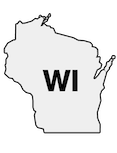
Wisconsin
Family Care & Family Care Partnership
Wisconsin operates two main managed LTSS programs: Family Care, which operates as a combined 1915(b) and (c) Waiver program, and Family Care Partnership ("Partnership" for short), which operates under a 1932(a) Waiver combined with a 1915(c) Waiver. Partnership has been in operation since 1996, and Family Care since 2000. Both are voluntary programs for non-elderly people with physical or developmental disabilities and elderly people needing LTSS. Family Care is a managed LTSS program that does not include primary care, while Partnership includes all LTSS and healthcare services (including Medicare-paid services if the person is dually eligible). Eligibility for the Partnership program is limited to people determined to have a "nursing home level of care" need. Family Care has a broader functional eligibility criterion, requiring that the person need personal assistance but not be nursing-home eligible.
Family Care has two capitation rate tiers, a blended rate for members with a nursing home level-of-care need, regardless of residential setting, and a rate for those without a nursing home level-of-care need. Partnership, whose participants all have a nursing home level-of-care need, has a single, blended capitation rate that applies to all members. In both programs, managed care organizations get a one-time Relocation Incentive Payment (of $1,000 as of 2015) for each member they transition out of a nursing home.
More information
Program documents
Contract with managed care organizations (both programs):
Waiver applications:
Level of need screen and assessment tool:
Individual Service Plan template:
Capitation rates & actuarial reports for both programs
Family Care, Partnership, and PACE member survey results:
Family Care, Partnership, and PACE Enrollment Data
Medicaid Managed Care Quality Strategy:
